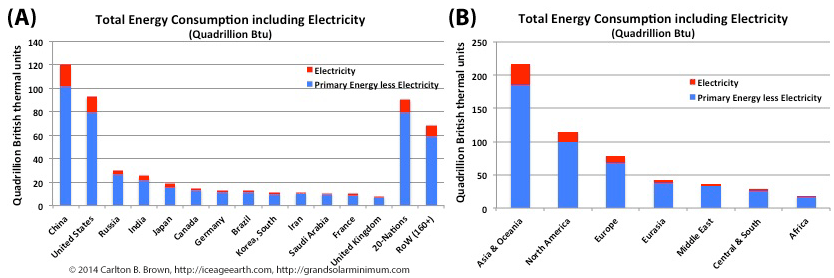Figures A and B) Twelve nations are responsible for about 70 percent of the energy consumed, with China and the USA alone accounting for 40 percent. Twenty other nations consume a further 17 percent, leaving the rest (160+ nations) to consume 12.6 percent.[1]
A small number of nations consume the majority of the world’s energy resources. Four nations—China, the USA, Russia, and India account for half of the world’s energy use. If China, the USA, India, and other large industrial nations accelerated their nascent energy system switches, this would have a major impact on extending the lifetimes of world energy reserves.
At the other end of the energy consumption spectrum, some 160+ nations consume 12.6 percent of fossil fuels consumed, while only holding about 4 percent of the world’s fossil fuels reserves. These 160+ nations’ are obviously dependent on energy imports, which make them vulnerable to a future tightening of energy supplies.
In 2015, electricity delivered to the end-user accounted for 13.5 percent of world energy consumption. Staggeringly, of the 575 quadrillion BTU of energy consumed each year, 72 quadrillion British thermal units (BTU) were delivered as electricity, while 146 quadrillion BTUs (of that 575 quadrillion BTUs) were lost in the production of that electricity at the time of its generation.[2] Put another way, one-quarter of all energy consumed is wasted in the process of generating electricity, due to inefficiencies of converting energy to electricity.
Therefore, of all the initiatives we can undertake, rapidly switching electricity generation systems to renewable energy will have the biggest impact on extending the lifetimes of our fossil fuel reserves. At the same time, making improvements in the efficiency of energy conversion into electricity, and the use of heat co-generation technologies in producing that electricity, would also save major amounts of energy.
[1] Data: Energy Information Administration: Primary energy and electricity consumption data were obtained from the International Energy Statistics data portal. World primary energy consumption by country (Quadrillion British thermal units, 1015 Btu), https://bit.ly/2xAB4sR. World electricity consumption by country (Billion Kwh) https://bit.ly/2J8TJ0t. Kilowatt hours (Kwh) were converted to British thermal units (Btu) using the 2015 conversion factor obtained from, https://www.eia.gov/energyexplained/index.php?page=about_btu. 1 kilowatt-hour = 3,412 Btu.
[2] Energy Information Administration. International Energy Outlook 2017. Release Date: September 14, 2017, Report Number: DOE/EIA-0484(2017). Data extracted from. Table F1. Total world delivered energy consumption by end-use sector and fuel, Reference case, 2015-50. https://www.eia.gov/outlooks/ieo/excel/appf_tables.xlsx. Downloaded 06/04/2018.

